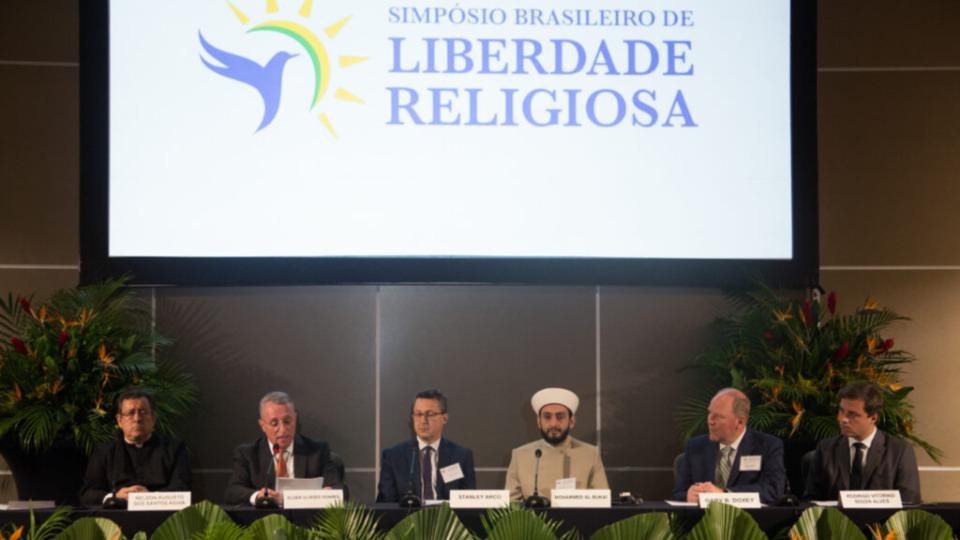
This story appears here courtesy of TheChurchNews.com. It is not for use by other media.
By Scott Taylor, Church News
RIO DE JANEIRO — The South American nation of Brazil is known and respected for its diversity and pluralism in race, ethnicity and religion. But like many other communities and countries, Brazil could benefit from architecture and structure for religious freedom — a much-needed structural element in preserving and enhancing that pluralism.
Speaking at Brazil’s first-ever symposium on religious freedom, Elder Ulisses Soares of the Quorum of the Twelve Apostles emphasized religious freedom as being key to Brazil’s plurality.
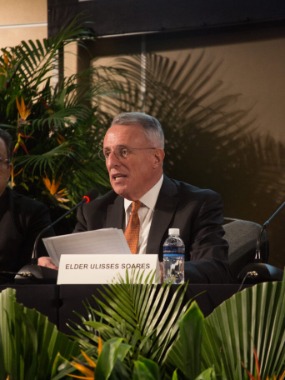
On behalf of The Church of Jesus Christ of Latter-day Saints, he joined representatives of other faiths as well as speakers from government; civic, education and media groups; and elsewhere.
“It is not only Brazil, but the whole world needs that foundation,” he told the Church News of his Wednesday, March 23, address. “We all need to develop that structure that we can respect each other — we can respect the way they live, the way they conduct their lives, and then live in peace with these differences.”
“My message is founded on this principle: that as we respect each other and live in peace with each other, at the same time we have the right to live what we believe and have other people respecting us. That is the foundation of a good society, a good ‘family,’ so we all can enjoy the beauty that Heavenly Father created for us, the world living in peace, and to be able to worship our Heavenly Father the way we believe is right.”
BYU’s First Symposium on Religious Freedom in Brazil
Titled “Religious Liberty: Foundational to Coexistence, Justice and Peace,” the March 23–25 symposium in Rio de Janeiro was organized by the International Center for Law and Religion Studies with Brigham Young University’s J. Reuben Clark Law School and the Brazilian Center of Studies in Law and Religion at the Federal University of Uberlândia, Brazil.
On the opening night, Elder Soares participated on the panel “Paths to Coexistence: The Content of Religious Plurality” and was joined by Pastor Stanley Arco, president of the Seventh-day Adventist Church for South America; Mohammed Al Bukai, sheikh and iman and director of Religious Affairs of the National Unity of Islamic Entities; and Deacon Nelson Águia, secretary of the Commission of Interreligious Dialogue of the Archdiocese of Rio de Janeiro.
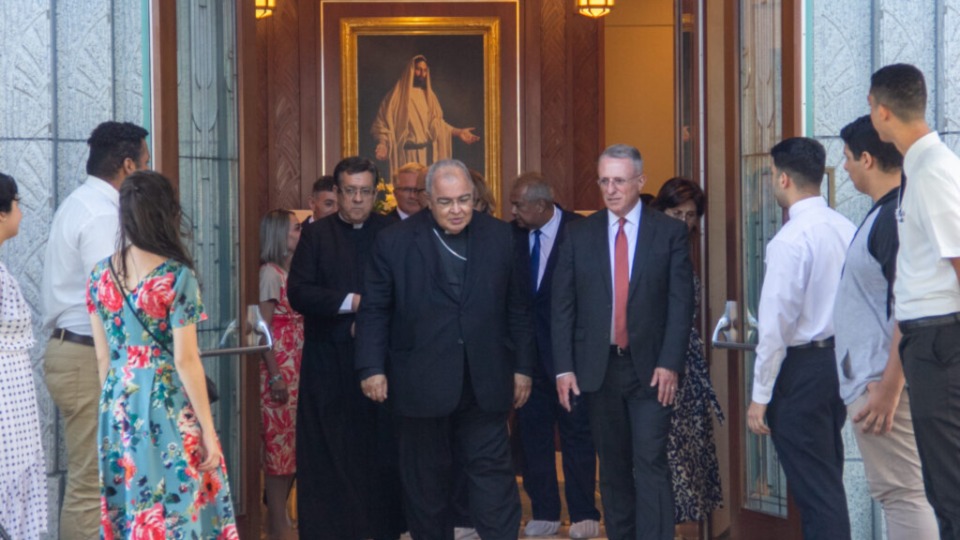
Nazila Ghanea, professor of international human rights law and director of the University of Oxford’s International Human Rights Programmes, gave the opening keynote address.
Additional panels, sessions and speakers were spread out over the three-day conference, with speakers and panelists coming from Brazil, Chile, Italy, Portugal, Spain, the United Kingdom, the United States and Uruguay. Topics of the presentations and panel discussions included religious freedom as a fundamental right, the freedom of expression and the role of religion in civil society.
Earlier on Wednesday, Elder Soares personally guided VIP tours of the new Rio de Janeiro Brazil Temple for several of the key presenters and attendees of the symposium, including a group led by Cardinal Orani Tempesta, archbishop of Rio de Janeiro.
On the evening of Thursday, March 24, more symposium participants were scheduled to attend the temple open house as part of the symposium’s schedule of cultural events.
The Purpose of Architecture
In his remarks titled “The Architecture of a Plural Society,” Elder Soares said each individual needs a home, a community and a place to live and feel welcome, and he underscored the importance of community collaborators who find meaning among others.
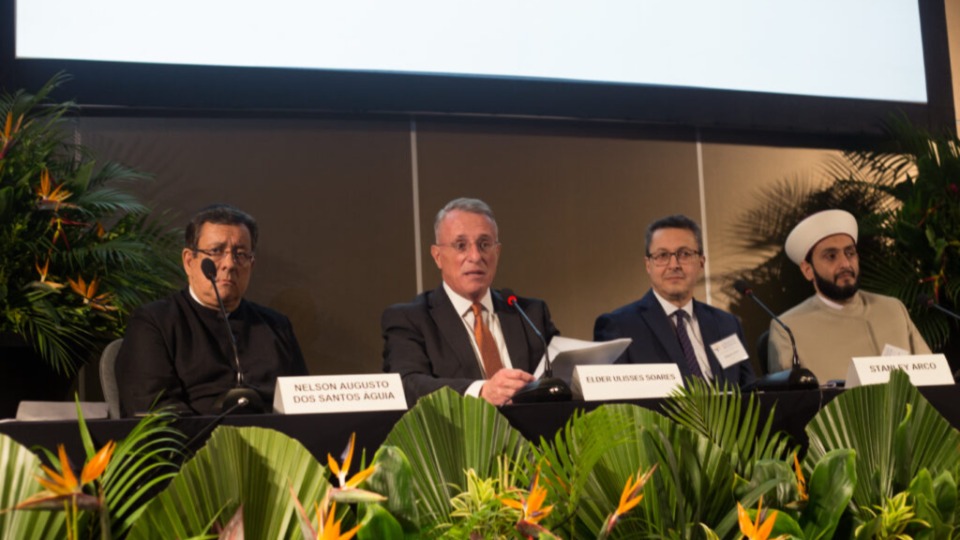
“Home is where we grow up, make mistakes, apologize, forgive, work, rest and dream,” he said. “A great human achievement — whether experienced in a nation, city, family, in marriage or in friendships — is similar to what takes place at home.”
Architecture is the art of bringing different materials together to build a structure. For example, wood, metal, concrete, glass and more are used to create a house with rooms filling various needs and functions.
Likewise, Elder Soares continued, a prosperous society has its own architecture and needs its own plan to channel several conflicting ideas, interest groups, politics, cultural factions and religious organizations. “When we all have a place to live, a space to think and the right to speak, the communities will be better. As long as individuals don’t harm or coerce anyone, our differences can enrich our coexistence.”
Globalization and technology have brought more people together, expanding communities and societies and resulting in collisions of identities and values, he said. “Our differences need not be seen as threats but rather as unique contributions to our neighborhoods, workplaces and schools. Integrated diversity, not armed ideology, is the way forward. The act of building is the act of belonging.”
A Framework for Managing Differences
Society is too big for people to avoid those they don’t like or their enemies, Elder Soares said. “We are not obligated to accept the religious or political beliefs of our neighbors, but social harmony and stability demand that we live with such beliefs even though they are different than our own. … Our only choice, then, is to learn to coexist.”
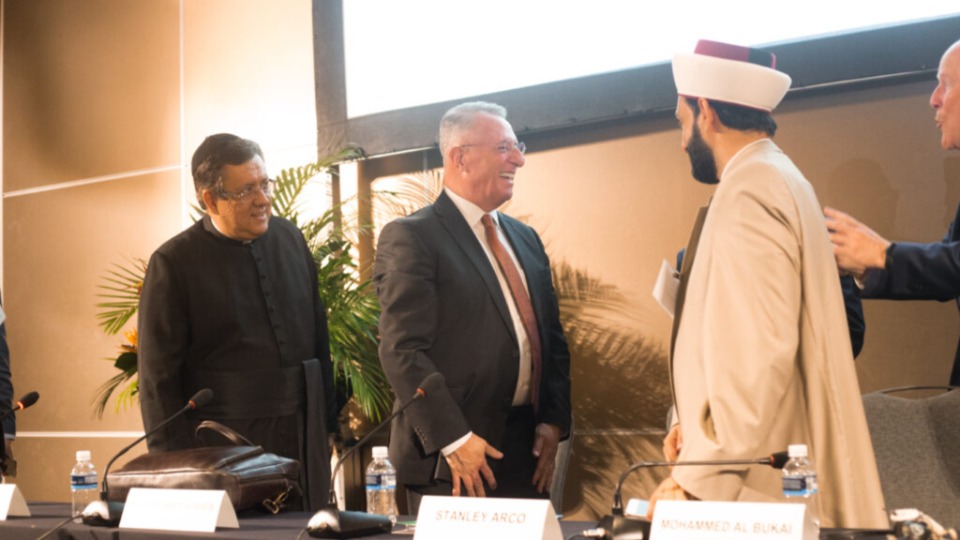
Religious freedom serves as the architecture of a healthy society, opening space for the expression of conscience and allowing differences to be debated without violence, he said. “Without this infrastructure, society breaks down into blocks of resentment, grievances, truth claims and power struggles. Left to their own fate, people revert to their old protective instincts.
“However, human wisdom has evolved enough to offer us better tools for cooperation.”
The Apostle said the structure of religious liberty rests on the dual foundation of law and culture, with a fair legal system and a culture of respect working together to protect citizens against the storms of ignorance and intolerance. Governments and courts cannot guarantee something the public doesn’t believe, and the conscience of citizens cannot be protected without the rights enshrined in the law.
Such a mutually reinforcing relationship requires constant care, with a stable society balancing the ideologies, beliefs and practices while encouraging respect and ensuring all abide by the law, he added.
“Constitutions around the world protect freedom of expression, the free exercise of religion and the freedom to peacefully assemble. The Universal Declaration of Human Rights as well as various regional courts and conventions also provide broad support for these aspirations. This architecture is not always successful, but it is our best hope in a plural world.”
Brazil a Positive Example
Brazil, Elder Soares said, is a positive example of how such a structuring has worked, avoiding widespread sectarian strife while the country underwent a dynamic shift from Roman Catholicism to Pentecostalism, Protestantism and other religious traditions. Dialogue among the various religious communities helped lessen tensions.
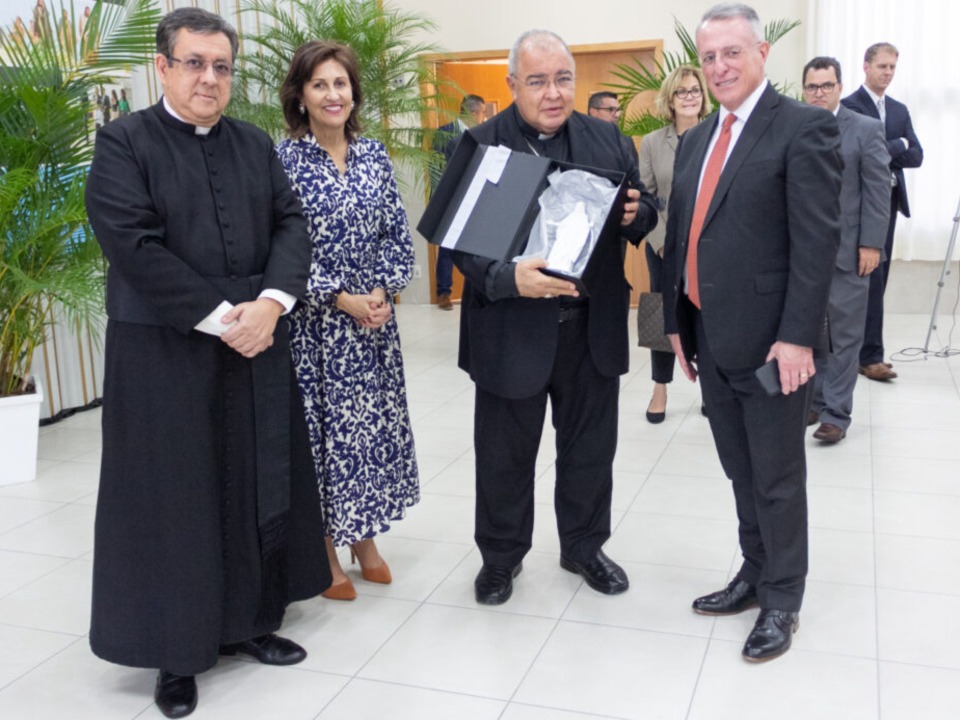
He quoted the recent remarks of President Dallin H. Oaks, First Counselor in the First Presidency, on religious freedom: “The key to stability and harmony is not homogeneity in religious or other foundational beliefs, but shared assurance that everyone will be secure in following his or her foundational beliefs.”
Elder Soares said that one way to establish the common good in political and civic arenas is to be fair in all approaches, having empathy in complex issues such as immigration, sexuality, identity and religion.
“Today’s media environment makes people see these differences as a winner-take-all battle — a harmful worldview that says you have to lose for me to win,” he said. “However, in many cases involving sincere disagreements, balancing opposing interests — rather than a war pitting them against each other — … is a more human practice of democracy.
“However, no society can thrive on difference alone. Citizens need a common moral foundation and a shared vision of the good. Scattered individual moralities cannot sustain a diverse culture.”
‘The Golden Rule’
Elder Soares said that freedom is achieved once individuals support the freedom of those they consider adversaries. “The real work of religious freedom begins when we realize that our interests are tied to the interest of everyone else.”
Citing the Savior’s words in Matthew 7:12 — “whatsoever ye would that men should do to you, do ye even so to them” — Elder Soares said, “The golden rule rings true and applies to both personal and civic life.”
He concluded: “The home we seek requires an attitude of vulnerability. Transparency can do wonders to bring people together. Having the faith that allows differences to be part of a dialogue can change the world. May we build a home for all people of goodwill to become brothers and sisters.”
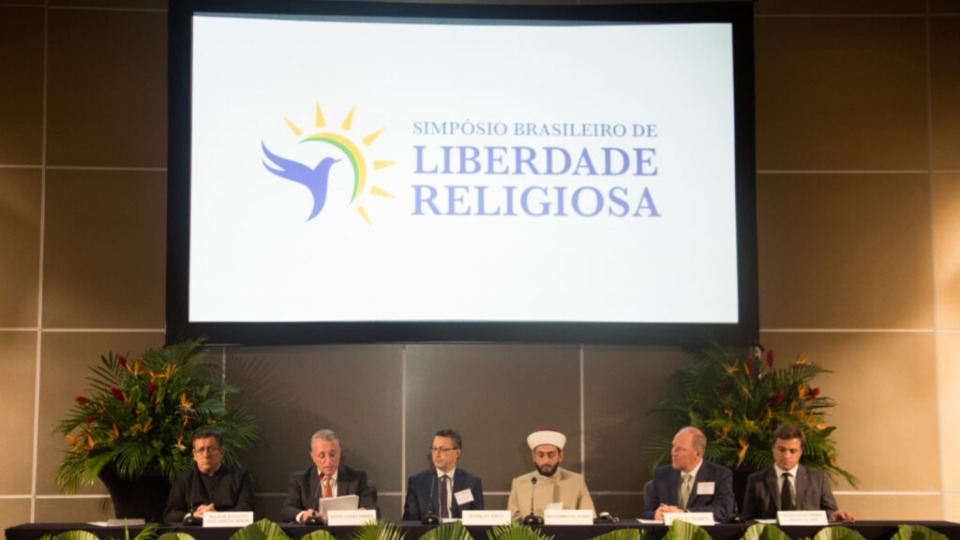
Brazil Embraces Religious Diversity
Religious freedom has generated a lot of interest in Brazil, said Gary B. Doxey, associate director at BYU’s International Center for Law and Religious Studies, who is cochairing the symposium with Federal University’s Rodrigo Alves.
Full of pluralism and diversity, “Brazil is a country that sort of leads the way in embracing diversity. It doesn’t create many of the tensions we see in some other areas of the world,” Doxey said. “And religious diversity is no exception.”
He continued, “It’s a country with very little social hostility toward religion or religious diversity, with very little government interference with religion. It’s an open society. And so in many ways, it could be an example country to others of how to deal with religious diversity and religious freedom.”
Many state bar associations across Brazil have religious freedom commissions. And the J. Reuben Clark Law Society has a large presence throughout the country. The law society is less an alumni association and more a professional association for lawyers wanting to pursue their profession in light of religious faith, with many who are not members of the Church of Jesus Christ, Doxey said.
Roles of Elder Soares, Brazil Area Leaders
Doxey underscored the importance of Elder Soares’s participation in the symposium.
“I can’t think of a person who is better positioned to represent the gospel of Jesus Christ in speaking about religious freedom to the people of Brazil,” he said. “Being a Brazilian and an Apostle of Jesus Christ, he has a truly deep feeling about the importance of these issues and a great love for the people, which brings home the power of His message.”
Doxey also credited the assistance of the Church’s Brazil Area Presidency and office staff with the symposium. “It is their contacts and their friendships with people of many different faiths and in various sectors of society that is making this people. They know the people, they already have the networks.”
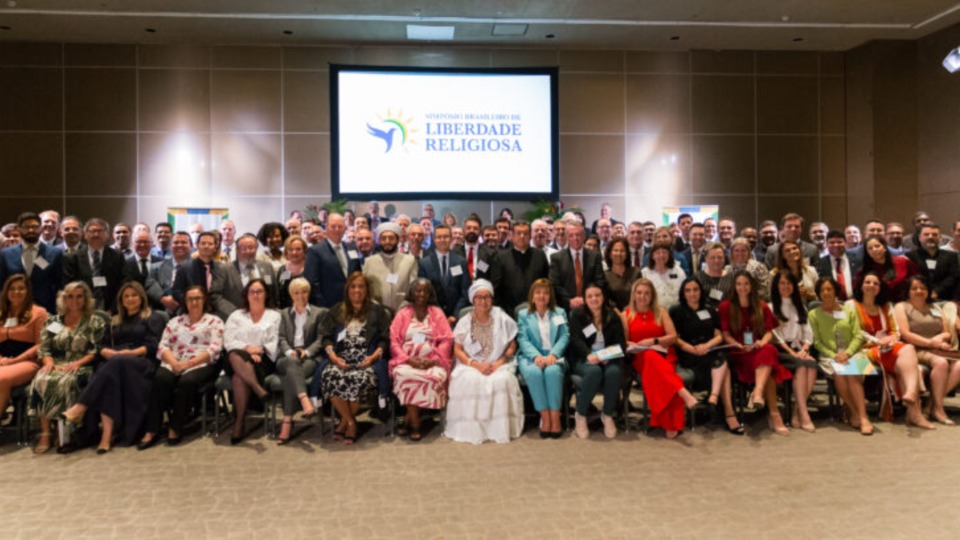
Copyright 2022 Deseret News Publishing Company